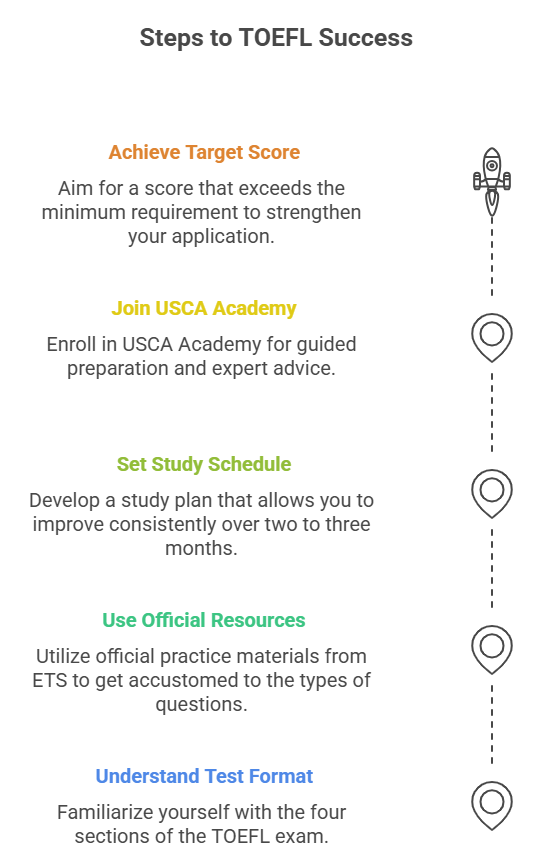Key Highlights of TOEFL Requirements for Canada Student Visa
Here are the main things you should know when you want to use the TOEFL iBT for studying in Canada:
- The TOEFL iBT is a good option. More than 95% of Canadian universities will take it for admissions in 2026.
- You can also use your TOEFL iBT score to apply for the fast Student Direct Stream (SDS) when you want a Canadian student visa.
- You must show that you know English well. The TOEFL is a trusted way to prove your english proficiency.
- The minimum total score needed by most undergraduate programs is between 80 and 90. The top universities may ask for 100 or higher.
- Both the test center and Home Edition of the TOEFL iBT are fine for your application.
Use your toefl ibt score and get ready for your student visa or apply with sds to top universities. You need a good english proficiency to study there. Make sure you meet the minimum score when you apply for a canadian student visa.
Introduction
Are you planning to study in Canada? If so, you need to show your English language proficiency. The Test of English as a Foreign Language (TOEFL) iBT and the Pearson Test of English (PTE) are tests that are known all over the world. They can help you get into your chosen Canadian university. This guide explains all the TOEFL requirements for Canada student visa in 2026. You will learn about the accepted scores, how to apply, and how the TOEFL requirements for Canada student visa fit with your study permit plans. This will help you move ahead with confidence as you work for your dream.
TOEFL Requirements for Canada Student Visa
Great news for those looking to study in Canada! The TOEFL iBT is a widely accepted English language test for Canadian student visa applications. Most universities and colleges trust this score as a reliable measure of language proficiency. Each institution sets its own minimum score requirement. A significant update from Immigration, Refugees and Citizenship Canada (IRCC) allows you to use your TOEFL score when applying for a Canada student visa through the Student Direct Stream (SDS). Since August 2023, the overall TOEFL iBT score requirement for SDS is at least 83, making it easier for international students to apply.
Why English Proficiency Matters for Canadian Study Permits
You might wonder why English skills are so important for studying in Canada. When you apply for a study permit, the Canadian government and your university want to make sure you can understand your classes and finish assignments, including understanding the tuition fees. Your TOEFL score is the main proof that you can read, write, speak, and listen in English. This helps you follow lectures, join discussions, and write essays.
Knowing English well does more than help you get accepted. It helps you adjust to life in Canada, make friends, and enjoy your studies. If your score on the Canadian study permit English test is too low, some schools may offer conditional admission, where you take extra English classes. But to get your study permit, you usually must meet the English requirements set by IRCC.
Types of TOEFL Tests Accepted for Canadian Visas
If you are preparing your application to study in Canada, choosing the right English test is important. The TOEFL iBT is the main test accepted by Canadian universities and the IRCC for student visa purposes. You can choose to take the TOEFL iBT either at a test center or at home with the Home Edition; both options are accepted.
Using your TOEFL iBT score is also valid for the Student Direct Stream to speed up your visa process. While there is the TOEFL Essentials test, most institutions prefer the TOEFL iBT for meeting requirements, and you should be aware that a skill retake option may not apply. Here are the accepted test formats:
- TOEFL iBT (Test Center Edition): You take this in person at a test center.
- TOEFL iBT Home Edition: You take this at home with someone watching online.
Minimum Score Requirements
The minimum TOEFL score for Canada depends on the institution. IRCC requires at least 83 on the TOEFL iBT for the SDS visa stream, but universities may have higher standards. Undergraduate programs usually need scores between 80 and 90, while graduate programs often ask for 90 or above top universities may require 100 or more. Colleges offering diplomas or postgraduate certificates typically accept scores from 79 to 88. Some schools also set minimum sectional scores. Always check the official admissions pages for exact requirements. Here are projected minimum TOEFL iBT scores for top Canadian universities:
| University | Minimum TOEFL iBT Score (Overall) |
|---|---|
| University of Toronto | 100 |
| McGill University | 90 |
| University of British Columbia | 90 |
| McMaster University | 86 |
| University of Alberta | 88 |
| University of Calgary | 90 |
TOEFL’s Acceptance by Canadian Universities and IRCC
- The TOEFL iBT is widely accepted across Canada for studies, with over 95% of Canadian universities including top institutions like the University of Toronto and the University of British Columbia accepting TOEFL iBT test scores. These scores are often considered the first step for students, allowing you to prepare for one test and use it for many applications.
- Your TOEFL iBT scores are also valid for study permit applications. Immigration, Refugees and Citizenship Canada (IRCC) accepts TOEFL iBT for all study permit uses, including Canada’s Student Direct Stream (SDS), which is a faster option popular among students from countries like India. This alignment simplifies the admission and visa process.
- While TOEFL requirements are generally the same for all international students in Canada, visa offices may request different documents in some cases. It’s important to check your country’s specific rules on the official IRCC website and confirm both your chosen university’s requirements and any visa-related language criteria.
Score Validity and Submission Rules
Once you take the TOEFL iBT, your test results and scores are valid for two years from your test date. Make sure to plan your test date so your scores are still valid when you apply to schools and for your study permit. Sending your scores is simple and done through the ETS website. You can send your scores to up to four schools for free when you register. For more than four schools, there is a fee.
Here is how you send your test scores to schools:
- Log in to your TOEFL account on the official ETS website.
- Click the “Send Additional Score Reports” option.
- Search for the school by its name or code, then send your test scores to them online.
You must also include your official TOEFL report with your study permit application.
Eligibility Criteria for Using TOEFL for Canada Student Visa
If you want to get a Canadian student visa, you may have to give a TOEFL score. The rules are simple. You have to show you know the English language if you are not from an English-speaking country. Many people use the TOEFL iBT to meet this rule for student visa applications, which may also require you to consider obtaining a work permit if you have accompanying family members.
But not everyone has to do this. There are some cases where you do not need to take this language testing. Let’s look at who needs to get ready for the TOEFL exam, and also find out which other options or exemptions some people might get.
Who Needs TOEFL
Most international students applying to study in Canada must show proof of English proficiency. If your previous education was not in English or you are from a non-English-speaking country, you will likely need to take a language test like the TOEFL or the Canadian Academic English Language (CAEL) Test.
Canadian institutions require this to ensure students can understand lessons and succeed in an English-speaking environment. Your TOEFL score proves your English skills and readiness for academic work. Requirements can differ, so always check with your chosen school for their specific English language criteria before applying.
Exceptions & Alternative Tests
Many students must take an English test like the TOEFL, but some may get exemptions. Usually, you can be exempt if you completed a few years of study in an English-speaking country like New Zealand or graduated from a school where English is the main language. Exemption rules differ by university, so always check with the admissions office for details.
If you don’t want to take the TOEFL, Canadian universities and IRCC accept other English tests. You can choose the one that suits you best. Some popular alternatives include:
- IELTS Academic
- PTE Academic
- CAEL Test
- Duolingo English Test
How to Prepare for TOEFL for Canada Student Visa

Preparing for the TOEFL exam is crucial for studying in Canada, as your score can significantly impact university admissions and your field of study visa application. Here are some tips to help you prepare effectively:
- Understand the Test Format: Familiarize yourself with the four sections: Reading, Listening, Speaking, and Writing. Knowing the structure helps reduce anxiety.
- Use Official Resources: Utilize official practice materials from ETS to get accustomed to the types of questions and time constraints.
- Set a Study Schedule: Most students study for two to three months. Develop a study plan that allows you to improve consistently, which may help prepare you for programs like the Canadian Experience Class.
- Join USCA Academy: Consider enrolling in USCA Academy for guided preparation and expert advice to enhance your academic English skills.
Aim for a score that exceeds the minimum requirement to strengthen your application.
Common Mistakes to Avoid When Submitting TOEFL Scores
Getting through the application process for a Canada student visa can be challenging. Here are some common mistakes to avoid when submitting your TOEFL scores, especially if you plan to apply for permanent residency through the express entry system:
- Not checking school requirements: Ensure you meet the minimum total and section test scores set by your university or program, in addition to general visa requirements.
- Delaying test-taking and score submission: TOEFL scores are valid for only two years, and delays in sending scores can jeopardize your application.
- Ignoring score discrepancies: If your scores are below the required thresholds, consider retaking the test or discussing options with the admissions office.
Conclusion
To sum up, knowing the TOEFL requirements for a Canada student visa is important for international students who want to study in Canada. Each university and program can have different score needs. So, you need to know the lowest acceptable scores and how to send in your results, along with the letter of acceptance from your university. Make sure you prepare well and try not to make common mistakes.
This will help your application to stand out. Showing your English proficiency not only meets the Canada student visa rules but also helps you do well in your classes and get along with others. If you want more help or have questions about the student visa or TOEFL requirements, you can get in touch with us at USCA Academy for special advice.
Frequently Asked Questions
1. Are there country-specific TOEFL requirements for international students?
No, the TOEFL iBT requirements do not change by where you are from. All international students who want a Canadian student visa must follow the same rules. The minimum score and test scores, including for IELTS General Training, you need for a student visa are set by Canadian institutions and the IRCC. This is for certain visa types like SDS. The rules do not depend on which country you live in.
2. Do Canadian colleges have different TOEFL requirements than universities?
Canadian colleges can be a bit more flexible when it comes to their English language proficiency rules than universities. If you apply to a Canadian university, you may need a minimum score of 90 to 100 on the TOEFL iBT, and you might also consider the International English Language Testing System (IELTS) as an alternative. Colleges that give diploma programs may accept TOEFL iBT scores in the 80 to 90 range. It’s always good to check what the school asks for their language proficiency requirements.
3. Do TOEFL requirements differ for online vs in-person programs in Canada?
Usually, no. The language requirements for both online and in-person programs at Canadian institutions are the same. The schools want to be sure that all students, especially those in skilled trades, no matter how they take classes, have the English skills they need to do well. The TOEFL iBT test is often used as the standard way to check these language requirements at Canadian institutions.
4. Are there exemptions from TOEFL for bilingual or English-taught high school graduates?
Yes, you can get an exemption. If you finished high school where classes were taught in English, or you are from a place where people speak English, you may not need to show proof of Canadian English Language Proficiency Index Program (CELPIP) or proof of English proficiency. You should ask the admissions office at the university you picked to find out their rules about waiving this.









